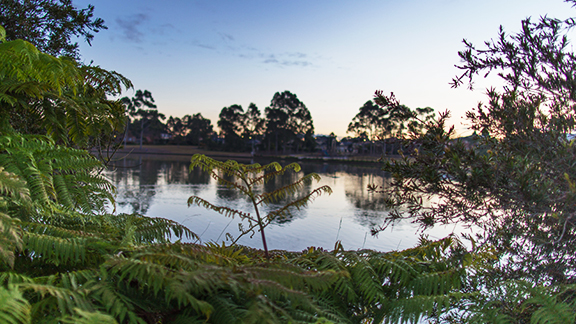There are a number of different types of pollution that have a large cumulative impact on our local environment. Traditional forms of pollution have included:
- Air pollution
- Water pollution
- Land contamination
Modern forms include:
- Thermal pollution, which is the discharge of heated water and is an aspect of water pollution
- Noise pollution, which encompasses roadway noise, aircraft noise, industrial noise and barking dogs
- Light pollution, which includes light trespass and over illumination, lighting such as floodlighting on sports fields, can be a source of pollution
- Visual pollution, which includes the presence of overhead power lines, billboard scarred landforms and the open storage of junk.
There are a number of different types of pollution that have a large cumulative impact on our local environment.
The Environmental Health Unit conducts a number of programs to ensure local businesses, including market gardeners, builders and developers, carry out their business in accordance with best practice principles and legislative requirements. These include audits of septic tanks, monitoring of building sites and education programs.
The Protection of Environment Operations Act, 1997 provides the legislative basis for environmental protection in areas such as pollution pertaining to air, noise, water and waste.
The Act provides Council's authorised officers with regulatory powers and tools to issue clean up, prevention and infringement notices, which are applied to the management of environmental issues and pollution events.
The following is a brief summary of actions Council may take:
Clean Up Notice
A clean up notice may be issued if an officer feels an incident has occurred or is likely to occur. The notice will detail what actions are required and a deadline for their completion.
A clean up notice is not appealable and incurs an administration fee of $466. Failure to pay the fee will incur a fine. Non-compliance can result in a fine or prosecution. Refer to the table below for details on fines.
Prevention Notice
A prevention notice may be issued when an officer suspects that an activity has been or is being carried out in an 'environmentally unsatisfactory manner'. The notice will detail what actions are required and a deadline for their completion. You have the right to appeal if you receive a prevention notice. An administration fee can also be charged.
Penalty Infringement Notices
A penalty infringement notice is an on the spot fine.
Western Sydney, including Liverpool, is particularly affected by air pollution due to patterns of air circulation and certain landforms in the greater Sydney region. We know from measurements taken by the NSW Department of Environment and Conservation, that air quality in Liverpool has remained fairly constant.
Motor vehicles, small industry and food businesses are some of the main contributors to poor air quality. The number of vehicles and small businesses has increased in line with the growth in the population of Liverpool. With economic growth also comes an increasing demand for industry and agriculture, which can both greatly, impact on air quality. Arson and brushfires also contribute significantly to poor air quality across the Sydney region.
Under the Protection of the Environment Operations Act, 1997 Council staff can issue offence notices to people not following set air quality standards. We are also looking at ways of managing the sources of air pollution in our region.
Contaminated sites that are not regulated by the DEC are managed by local councils.
Local councils also have responsibilities in relation to contaminated land during the environmental planning and development assessment process. When considering a development application, Council may take into account possible future contamination of the land caused by the proposed activity and place conditions on the development to minimise the possibility of future contamination. For more information on Contaminated Lands refer to the NSW Department of Environment and Conservation.
Did you know you can be fined for not covering your load of waste? Ensure each load of waste you transport is adequately covered. Don't risk a $500 fine.
When transporting waste, it is your responsibility to make sure:
- You know what you're carrying
- The waste load is covered and tied down
- The waste does not leak or spill onto the road
- Dust and other debris are not being blown off the load
- The waste is deposited at a landfill or resource recovery facility that can legally accept it.
Illegal dumping of rubbish, soil and cars can be a problem and Council relies on residents to help identify where rubbish, soil and cars have been dumped.
Abandoned vehicles must be reported to the local police station by phoning 9765 9499.
Please note that residents are entitled to two large bulky good collections a year. For more information, click here.
The Environmental Health team investigates illegal dumping of fill on properties. Owners of premises on which fill is dumped are required to produce reports showing soil is not contaminated.
Council strongly recommends that any land that may be accessible for illegal dumping, in particular vacant and rural properties, be fenced to deter illegal dumpers.
Material such as building waste, household waste or other waste that may constitute land pollution is dealt with by Council’s Environmental Health team in the same manner as contaminated soil.
If you see something that is of concern, you can contact Council to investigate. Please provide the following information:
- Date and time the pollution incident occurred or was observed;
- Address where the issue is occurring; and
- Any further details that may assist the investigating officer.
Complaints can be lodged by contacting Council’s Customer Service Centre on 1300 36 2170 or by our online request service.
Water pollution is largely caused by human activity and has had a major impact on our local waterways and their ability to be healthy and function naturally.
Water pollution comes from two sources - point sources or diffuse sources:
- Point source pollution is any pollution that originates from a single location. It is often associated with intensive production activities including farming, manufacturing and service sectors such as sewage treatment plants, on-site sewage management systems, industrial activities and discharges from urban stormwater drains. Point sources are largely regulated through the Protection of the Environment Operations Act, 1997. The Act permits Council and the NSW Department of Environment and Conservation to regulate various polluting issues, including issuing clean up or prevention notices.
- Diffuse sources are generated mainly by run-off after rain, which collects pollutants from across a wide area. Diffuse sources in urban areas include roads, industrial and commercial premises, parks, gardens and households. Stormwater typically contains litter, nutrients, bacteria, pathogens pesticides, heavy metals, sediment, oils, grease and other pollutants.
Noise pollution is defined as a noise source that is intrusive and/or offensive, where the noise source exceeds the criteria as defined under the Protection of the Environment Operations Act 1997.
Air-conditioners
If you are interested in purchasing an air conditioner it is important that the noise it makes when operating does not intrude on your neighbours.
Domestic air conditioners cannot be operated at certain times if it can be heard inside any habitable room of another residential premises. If it can be heard inside the residential dwelling, you cannot operate your air conditioner between these times:
- Between 10pm and 7am weekdays
- Between 10pm and 8am weekends and public holidays.
Ways you can reduce the noise impact of your air conditioner:
- Regularly service your air conditioner
- Install an acoustic enclosure
- Erect a solid fence or barrier around the unit.
Noise from Licensed premises
The Liquor Administration Board manages noise from licensed premises such as bars, pubs, clubs and restaurants that serve liquor.
To place a complaint contact the local police or the Liquor Administration Board on 9995 0300 or visit Liquor and Gaming NSW.
Noise complaint enforcement
Council officers can issue Noise Abatement Orders, Noise Abatement Directions and Noise Control Notices.
If you would like to make a noise complaint please phone our Customer Contact Centre on 1300 36 2170.
| Noise | Hours permitted |
|---|---|
Power tools Powered garden tools Compressors Leaf blowers Circular saws Electric or pneumatic tools Chain saws Gas or air compressors Lawn mowers Swimming pool and spa pumps |
Monday to Saturday 7am to 8pm Sunday and public holidays 8am to 8pm |
Musical instruments and sound equipment | Monday to Thursday & Sunday Friday, Saturday or day immediately before a public holiday |
Air conditioners | Monday to Friday Weekends and public holidays |
Motor vehicles Trucks(Except when leaving or entering residential premises) | Monday to Friday Weekends and public holidays |
Refrigeration units fitted to a motor vehicle | Monday to Friday Weekends and public holidays |
Burglar alarm | Call Police |
Outside these hours restrictions can be placed on using these articles if they cause offensive noise. Offensive noise is defined as 'that, by reason of its level, nature, character or quality, or the time at which it is made, or any other circumstances:
- Is harmful to (or is likely to be harmful to) a person who is outside the premises from which it is emitted, or
- Interferes unreasonably with (or is likely to interfere unreasonably with) the comfort or repose of a person who is outside the premises from which it is emitted.
To deem the noise offensive Council may need to conduct a noise measurement, should this indicate non-compliance a Noise Control Notice may be issued. Should you wish to take action independently of Council you can contact the Local Court to seek a noise abatement order (Note: Fees do apply).
For further information on noise visit the Department of Environment and Conservation NSW.


